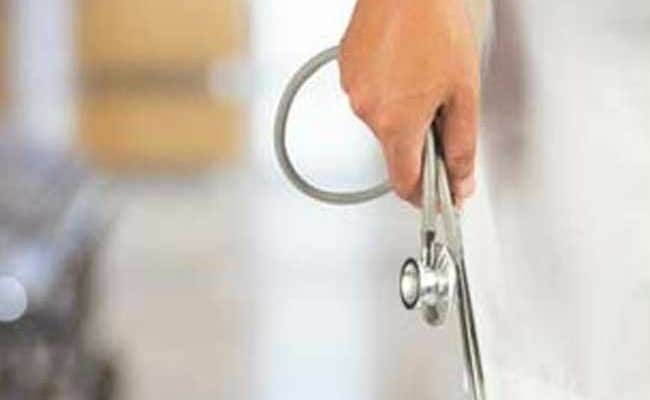
Representational Image.
London:
It is not always a doctor who is checking people - blood sugar, blood pressure, haemoglobin and other parameters - at the free health camps in India. The prestigious medical journal from UK, British Medical Journal, better known as BMJ, says it is mostly unlicensed sales representatives.
This is a violation of the regulations of the Medical Council of India, or MCI, and in case of wrong readings, can endanger a person's health.
Free 'health camps' for the poor have grown popular in India, Frederik Joelving, a Denmark-based journalist wrote in BMJ. Locals are invited to such camps that may include medical testing done by drug representatives or technicians, he said.
The researchers say they have evidence that unlicensed employees from several Indian drug firms and from the Indian arms of Abbott, Bayer, GlaxoSmithKline, Roche, and Sanofi have tested patients at health camps.
According to the MCI, the practice is unauthorised and only a registered medical practitioner can perform screening and diagnostic tests. Likewise, it is considered unethical for doctors to prescribe specific products in return for testing services from a drug company.
In their responses, most pharmaceutical companies denied any wrongdoing, BMJ noted.
Cipla acknowledged that its employees test patients, wrote Mr Joelving. He quoted a spokesperson from GlaxoSmithKline (GSK) India, denying their employees perform tests on patients in India.
The journal, however, quoted a GSK sales representative from West Bengal, Pinaki Dutt, as saying that in 2013, he and his colleagues were required by "company policy" to do blood sugar tests at health camps.
A Roche spokesperson said the Indian arm of the company donates testing supplies to diabetes education camps but added that "people with diabetes who attend the camp test on their own, after having signed a written consent," BMJ reported.
The Indian subsidiaries of Abbott Laboratories have been particularly active in the push for screening, reported Mr Joelving, with each of the company's business divisions organising health camps.
In 2011 alone, the company said, it screened more than 240,000 people for thyroid disorders.
"Health camps must not be supported in exchange for an explicit or implicit understanding to purchase, order, recommend, prescribe or provide favourable treatment to any Abbott products," Abbott officials were quoted as saying by BMJ.
But the sales of its flagship product Thyronorm (thyroxine hormone) meanwhile, raced ahead of cheaper competitors in India, the report said.
An Abbott representative who does screening at diabetes camps reportedly said these services have nothing to do with charity. "The only objective is the business transaction," the representative was quoted as saying.
This is a violation of the regulations of the Medical Council of India, or MCI, and in case of wrong readings, can endanger a person's health.
Free 'health camps' for the poor have grown popular in India, Frederik Joelving, a Denmark-based journalist wrote in BMJ. Locals are invited to such camps that may include medical testing done by drug representatives or technicians, he said.
The researchers say they have evidence that unlicensed employees from several Indian drug firms and from the Indian arms of Abbott, Bayer, GlaxoSmithKline, Roche, and Sanofi have tested patients at health camps.
According to the MCI, the practice is unauthorised and only a registered medical practitioner can perform screening and diagnostic tests. Likewise, it is considered unethical for doctors to prescribe specific products in return for testing services from a drug company.
In their responses, most pharmaceutical companies denied any wrongdoing, BMJ noted.
Cipla acknowledged that its employees test patients, wrote Mr Joelving. He quoted a spokesperson from GlaxoSmithKline (GSK) India, denying their employees perform tests on patients in India.
The journal, however, quoted a GSK sales representative from West Bengal, Pinaki Dutt, as saying that in 2013, he and his colleagues were required by "company policy" to do blood sugar tests at health camps.
A Roche spokesperson said the Indian arm of the company donates testing supplies to diabetes education camps but added that "people with diabetes who attend the camp test on their own, after having signed a written consent," BMJ reported.
The Indian subsidiaries of Abbott Laboratories have been particularly active in the push for screening, reported Mr Joelving, with each of the company's business divisions organising health camps.
In 2011 alone, the company said, it screened more than 240,000 people for thyroid disorders.
"Health camps must not be supported in exchange for an explicit or implicit understanding to purchase, order, recommend, prescribe or provide favourable treatment to any Abbott products," Abbott officials were quoted as saying by BMJ.
But the sales of its flagship product Thyronorm (thyroxine hormone) meanwhile, raced ahead of cheaper competitors in India, the report said.
An Abbott representative who does screening at diabetes camps reportedly said these services have nothing to do with charity. "The only objective is the business transaction," the representative was quoted as saying.
Track Latest News Live on NDTV.com and get news updates from India and around the world

